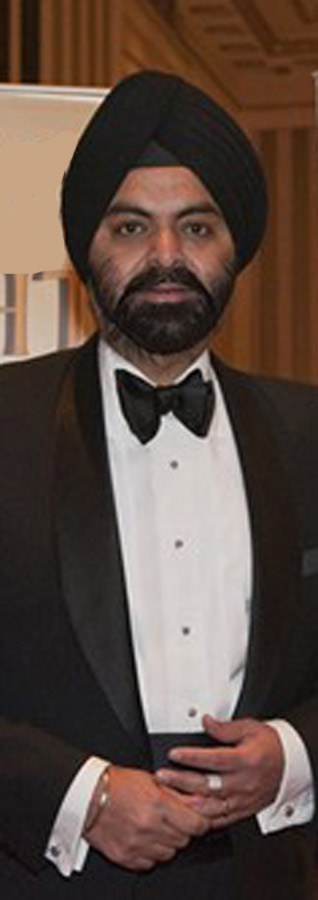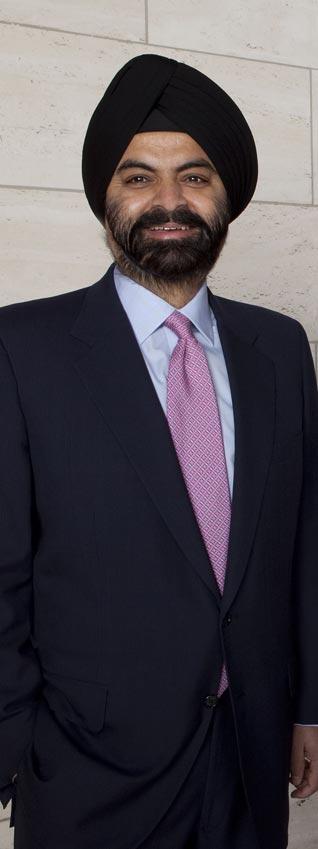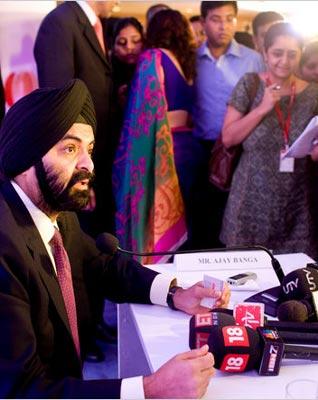People
Ajay Singh Banga: Who Needs Cash (Or Borders)?
by VIKAS BAJAJ & ANDREW MARTIN
A day after the Indian government started a campaign to give identification numbers to all its 1.2 billion citizens, Ajay Singh Banga, the newly minted chief executive of MasterCard, arrived in town, eager to lend a hand.
The program will identify people based on fingerprints and retina scans, and could make it easier for the government to route food stamps and other payments to people below the poverty line.
Ajay says he believes he has a simple way to process the payments: via the MasterCard network.
"I wasn't educated in the U.S.; I was educated in India. I understand what you are trying to do," he said during a news conference at the Trident Hotel, in the financial center here. "I think it's a huge opportunity for our government and people and companies like ours."
Though Ajay has risen to the top ranks of American business, the roots of his success are firmly planted in India, where he was born, raised and got his start in business. His success at MasterCard may well depend on India, too.
Observing that 85 percent of the world's transactions are still in currency, he has declared a "war on cash" to nudge as many consumers as possible toward electronic payments, preferably processed by MasterCard. Although competition to handle payments is intense in the United States, the wider battlegrounds are in countries like India and Brazil, which have vast numbers of people without bank accounts, and a growing middle class.
Capturing only a small fraction of those customers - with prepaid debit cards, mobile payment systems or credit cards - could exponentially expand MasterCard's business and profits. "Whether it's 200 million or 400 million, it's a lot of millions," says Ajay, referring to estimates of the size of the emerging global middle class over the next five years or so.
Nevertheless, Ajay Singh Banga, 50, is taking over MasterCard as it faces huge challenges, from new rules governing credit and debit cards in the United States to nimble new rivals offering online and wireless transactions. And, of course, there's Visa, its much larger rival.
"Visa and MasterCard are going to have to generate new business, and that's overseas," says David Robertson, publisher of The Nilson Report, an industry newsletter. "What you want to do is find new virgin territory where the margins aren't compromised by competition."
In Ajay, MasterCard believes it has found an ideal, if unconventional, candidate for tackling such tasks. A Sikh with a jet-black mustache and beard, he says he loves the New York Mets, Lady Gaga, Elvis Presley and Sikh spirituals, in no particular order.
During a recent dinner of Southeast Asian food at the luxurious Imperial Hotel in New Delhi, he teased Vicky Singh Bindra, a regional MasterCard manager, for ordering khichdi, a simple Indian dish of rice and lentils.
His globe-trotting identity and animated personality are in jarring contrast to previous MasterCard chief executives, who were typically buttoned up, American and, often, Ivy-league educated
"He brings a different vibe, a different sense of urgency to the company," says Adam Frisch, an analyst at Morgan Stanley. "I expect MasterCard's velocity to change."
For example, Ajay shook up the company by declaring that any request to headquarters not acted upon in two weeks would be automatically approved - a directive meant to speed decision-making.
For its first four decades of existence, MasterCard - originally known as MasterCharge - was owned by the nation's banks and was a reliable cash cow for them. Visa was also owned by the same banks, so there wasn't much head-to-head competition between the two.
Nonetheless, MasterCard developed a reputation for being more conservative and flat-footed than Visa. Not only was Visa more aggressive in pursuing the debit card market in the United States, which it has come to dominate, but it pushed ahead of MasterCard in the nascent prepaid-card market and in pursuing new business in developing countries in Latin America and Asia.
The differences became apparent when both companies went public - MasterCard in 2006 and Visa in 2008. Mr. Frisch says investors believed that MasterCard had a "phenomenal" business model and a well-known brand. Indeed, MasterCard's stock price has risen more than fivefold since the company went public.
But when Visa went public in 2008, investors found that Visa's execution in important growth areas was even better. Visa's market capitalization is now nearly twice that of MasterCard.
Last year, MasterCard reported profit of $1.5 billion on $5.1 billion in revenue, compared with Visa's $2.4 billion in profit on revenue of $6.9 billion in the fiscal year ended in September 2009.
"Visa was perceived as a faster, more entrepreneurial company," Mr. Frisch says. "It appeared that MasterCard was more satisfied with maintaining the status quo."
Ajay's hiring was a bold, though perhaps belated, effort by MasterCard's board to change all that.
* * * * *
Ajay Banga has made a long, circuitous journey to the leafy confines of Purchase, New York, U.S.A., where MasterCard's campus-like headquarters sits across the road from regal estates.
His mother was the first member of her family to earn a college degree; his father was an officer in the Indian army, and the family moved often. Vicky Singh Bindra, the MasterCard manager who has known him for nearly a decade, says the family's military imprint is visible in Ajay's continuing desire to please his parents.
Ajay is also close to his older brother, Manvinder, who rose to the top ranks at Unilever and is now at the private equity firm Clayton Dubilier & Rice in London. His sister, Deepa Kaur Dhodhi, lives in Houston and is a business manager for a trading house.
Once out of college, Ajay began his career in management-level jobs in India for Nestlé and PepsiCo, where he scrubbed toilets and breaded chicken at Kentucky Fried Chicken (then part of PepsiCo) to get a sense of what running a restaurant was like. He also got his first taste for American-style fast food and marketing.
Ivan Menezes, chief executive for North America at Diageo, the liquor conglomerate, first met Ajay when they were 17 and studying at Delhi University. They had much in common: their fathers worked for the government, and both had older brothers who were "legendary" students, Mr. Menezes says.
Even then, he says, Ajay stood out for his smarts and his ability "to connect with people."
Later, they attended graduate school together, and both joined Nestlé in 1981, when it had a relatively small footprint in India. "They sent you out for the first 18 months in the most remote parts of India," says Mr. Menezes, who is also Diageo's chairman for the Asia-Pacific region. "We exchanged horror stories."
Nevertheless, it was a heady time. Every product they introduced seemed to catch fire, and nearly every night they would socialize with a close group of friends. "We kind of sat next to each other and worked hard and partied hard," he says. "What you see today is the same Ajay."
Ajay joined Citigroup in 1996 and quickly rose through the ranks, hopscotching the globe along the way. He moved his family - his wife, Ritu, and two daughters - to London, Brussels, Hong Kong and New York.
Dinyar S. Devitre, who was in charge of Europe and the Middle East for Citigroup, hired Ajay as his right-hand man in the late 1990s. He praises Ajay's smarts and his ability to take on difficult tasks. For example, after Mr. Devitre assigned him to take over Citi's relatively small operations in Central Europe and the Middle East, Ajay built them into major businesses.
"He made things happen; he made whole cloth out of the businesses in those markets," Mr. Devitre says. "He knows how to navigate a path through obstacles by getting the cooperation of the people he is working with."
From 2000 to 2002, he ran CitiFinancial in New York, which offers mortgages and other consumer loans. When Ajay arrived, the division was being investigated by the Federal Trade Commission for possible predatory lending practices. His task was to clean up the unit, which became part of Citigroup in an acquisition. The inquiry eventually resulted in Citigroup agreeing to a $215 million settlement in 2002.
From 2002 to 2005, he oversaw North American retail banking, a vast network of branches and consumer products that included mortgages, student loans and car loans. He took over the international consumer business in 2005.
During his Citigroup tenure, the bank came under considerable fire for some of the mortgages and credit cards it offered, and for investments in exotic financial instruments. The latter nearly caused Citigroup to go under in 2008 and 2009, but the bank was propped up by a government bailout.
A Citigroup spokeswoman said Ajay was not involved in mortgage-backed securities or other financial instruments that caused Citi's problems. When asked what he gleaned from its woes, Ajay said he had nothing to do with them and declined further comment.
His last job was supervising Citi's highly lucrative Asia Pacific region from Hong Kong, where he oversaw China, Vietnam and other developing markets - now fertile territory for MasterCard.
Mr. Devitre says he believes the fact that Ajay is a Sikh has ultimately worked to his advantage, despite an occasional uncomfortable glance or comment. He says it takes a lot of conviction to wear a turban, a central tenet of Sikhism, at an American-based corporation. "People look at him and say: ‘He wears a turban and he made it to the top. He must be extraordinarily gifted.' "
For all his international experience at Citi, Ajay also traveled extensively in America, going to cities and towns from Shreveport, La., to Billings, Mont. He has decorated his relatively modest office in Purchase with souvenirs including a miniature cowboy boot from Dodge City, Kan., with a "Made in China" sticker on the bottom.
* * * * *
At Citigroup, Ajay was on a short list of potential chief executives. But when MasterCard called in 2009, he was hired as chief operating officer with the understanding that he would soon run the company.
He took over on July 1, 2010, in one of the most difficult periods in MasterCard's history. The global recession had curbed credit card use, and the new government regulations have cut into the profitability of credit and debit cards - and weighed down MasterCard's and Visa's stock prices.
At the same time, new technologies threaten to upend the traditional dominance of Visa, MasterCard and American Express, particularly as payments move to mobile devices. In India, banks and the government, for instance, are experimenting with mobile money transfer systems that could keep MasterCard and Visa - and the fees that come with them - out of the loop.
While acknowledging the obstacles, Ajay says the challenges are far outweighed by the vast opportunities for electronic forms of payment.
Besides the opportunities in developing countries, many governments and companies are viewing plastic as a more efficient way to pay people, particularly those without bank accounts. Some Social Security payments are now available on MasterCard prepaid cards, as are some paychecks, school refunds and tax refunds.
"Cash is expensive; cash is inefficient," he says. "You have to print it, transport it, secure it, store it and change it."
During his recent visit to India, he announced an investment in an Indian payment processing company. But he was also looking for broader opportunities, like the identification program.
Of course, the Indian government could find other networks for payments. But MasterCard hopes that Ajay's ability to glide among cultures, languages and borders gives it an edge.
Those skills were on display during his recent India trip. In Mumbai, speaking in Hindi, he joked with waiters who were trying to have him eat rasmalai, a rich, milk-based dessert flavored with cardamom and pistachios. "If I do, will you come to the gym with me?" he asked.
At a dinner in Delhi with colleagues from New York and Singapore, he spoke animatedly in English about how much he liked "Freud's Last Session," an off-Broadway production about a hypothetical meeting between Sigmund Freud and C. S. Lewis.
Asked if his coming of age and his education in India might explain his success, Mr. Banga says, "I really don't think that defines me."
He also brushes off questions about his appearance. "People say ‘How does it feel to be looking like you, working in the West?' " he notes.
Without skipping a beat, he replies in fluent Hindi: "What difference does it make?"
[Courtesy: New York Times]
October 17, 2010
Conversation about this article
1: Bhupinder Singh Ghai (New Delhi, India.), October 17, 2010, 9:27 AM.
There are some things money can buy, but to be at the top at MasterCard, with a turban ... PRICELESS!
2: Peejay Singh (Victoria, Birtish Columbia, Canada), October 17, 2010, 2:59 PM.
It is indeed "PRICELESS" to have a Sardar heading a major corporation like Mastercard. Ajay, you make us proud. All Sardars who hold senior positions in any international business arena deserve accolades. Unfortunately, many of our younger Sikhs are prepared to shed their identity in order to move up the corporate ladder. There was a time when most senior Indian Army officers had Sikh their identity intact, but, alas, that is not the case anymore. Ajay is a great role model for our younger Sikhs.
3: Taran (London, United Kingdom), October 17, 2010, 3:55 PM.
It makes the whole Sikh nation proud to see people like Sardar Ajay Singh Banga riding high on success. May Chardi kalaa be with him, always!
4: C. Kaur (U.S.A.), October 17, 2010, 5:02 PM.
It seems that it has been easier for Sikh-Indians to climb up in western multinationals through their India/ Asia divisions. Although we have had very successful Sikh-American entrepreneurs, so far I'm not aware of any Sikh-American Sikh being appointed a CEO of a multinational corp. Hopefully, Ajay's visibility will also pave the way for Sikh-Americans to be more accepted into executive positions in corporate America.
5: Bibek Singh (Jersey City, U.S.A.), October 18, 2010, 2:26 PM.
Best wishes!
6: Dr. Birinder Singh Ahluwalia (Toronto, Ontario, Canada), October 19, 2010, 7:51 AM.
During the current times, in this age of globalization where economic success is based on winning larger or expanded market share in a global setting and in each and every sector of the planet, an economic playground to increase one's reach for products and services - any country or corporation that attempts to discriminate based on looks and color (during hiring and promotion) will certainly lose/ suffer tremendously vis-a-vis making meaningful gains both in the short and long run. By a large margin - compared to any other community - Sikhs are extremely well educated, smart and intelligent, law abiding, loyal, faithful, innovative and hard working people with a keen sense of spirituality and uncanny sense to judge right from wrong. They are, and always will be, a great asset to any corporation or nation that engages them in leadership roles.
7: Bally (Warwick, United Kingdom ), October 19, 2010, 11:13 AM.
Wish him lots of luck on his big journey!
8: Gurteg Singh (New York, U.S.A.), October 19, 2010, 1:40 PM.
The Sikh identity which would have received a huge world-wide visibility by Obama's visit to the Darbar Sahib, may be cancelled unfortunately because Obama's handlers do not want him to be photographed as a Muslim in the scarf that he will have to wear inside the Gurdwara. This is what our inarticulate S.G.P.C. had to say to the New York Times: "To come to Golden Temple he needs to cover his head," said Dalmegh Singh, Secretary of the Committee that runs the Temple. "That is our tradition. It is their problem to cover the head with a Christian hat or a Muslim cap."
9: Tarsem Singh (Milton Keynes, United Kingdom), October 19, 2010, 3:29 PM.
It is a source of great pride for the Panth to see a "saabat soorat" Sikh reach the top height of corporate America. I wish Ajay Singh even more success, so he may keep on inspiring young Sikhs all over the world.
10: Jessie Parmar (Lethbridge, Alberta, Canada), October 23, 2010, 3:31 AM.
we are proud of you! And look up to you, brother! Cheers!






